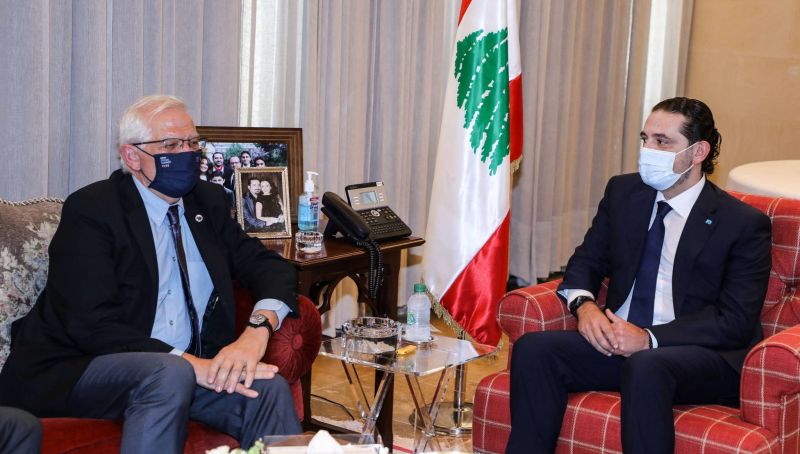
Borrell meets with Hariri. (Credit: Dalati and Nohra)
Want to get the Morning Brief by email. Click here to sign up.
The European Union’s foreign policy chief cautioned that EU sanctions could ensue if Lebanese politicians fail to set their feuding aside and form a government capable of tackling the financial crisis. Josep Borrell’s warning came amid a two-day visit to Lebanon during which he held meetings with President Michel Aoun, caretaker Prime Minister Hassan Diab, Premier-designate Saad Hariri and Parliament Speaker Nabih Berri. Describing Lebanon’s economic woes as “local and internal,” the EU envoy bluntly told the press at the conclusion of his trip that the country’s financial troubles will not be eased without a cabinet that has the “technical capacity and authority” to push through a financial reform plan in collaboration with the International Monetary Fund — something Diab’s government failed to do. Borrell’s remarks followed media reports that the EU is mulling sanctions that will target the travel rights and overseas assets of Lebanese political figures, many of whom hold property and business interests in its member states.
Gebran Bassil affirmed his support for a new cabinet led by Saad Hariri. During a televised speech on Sunday, the Free Patriotic Movement leader said he wants Hariri to lead the next government and blamed his party’s political opponents for not only derailing government formation but also for attempting to prevent his father-in-law, President Michel Aoun, from naming any of the ministers in the new cabinet, saying that they want to turn Aoun into “a picture on the wall.” Bassil appealed to Hezbollah’s leader, Hassan Nassrallah, to arbitrate the Aoun–Hariri feud at the core of the cabinet formation stalemate. Bassil’s endorsement of Hariri follows a week in which speculation mounted that the premier-designate is considering the option of recusing himself from the post to which he was appointed eight months ago tomorrow.
Areas of the Chouf district in Mount Lebanon were again without internet connectivity on Saturday. For the third time in a week, state telecommunications company Ogero apologized for a disruption in service, citing the cause as the overloading of its backup generators leading to some of them having to be switched off. The company has warned that as long as the electricity rationing and fuel shortages plaguing Lebanon continue, its ability to provide consistent service will remain compromised and intermittent internet outages will persist.
BDL will start referring money changers to the Higher Banking Commission for investigation as of today, the bank’s press office said. After examining the transactions registered on Sayrafa, BDL’s currency exchange platform for commercial banks and money changers, the bank concluded Thursday that exchangers are not adhering to its instructions since they are not registering all their transactions on the platform. The investigation will start with Class A exchangers — major money changers with at least LL750 million in capital, BDL said. The Higher Banking Commission’s main role is to impose sanctions on financial institutions that violate the law or BDL’s measures. Additionally, from Monday BDL will start selling US dollars daily to clients registered on Sayrafa. To obtain these dollars, clients should provide relevant documents and deposit the counter value in cash lira at commercial banks. Banks are requested to sell these dollars mainly to food importers and families of students studying abroad.
A recently formed parliamentary subcommittee will meet again today to resume its discussion of two proposals aimed at replacing the current state subsidies system. Both proposals, presented by Prime Minister Hassan Diab and FPM leader Gebran Bassil respectively, entail replacing subsidies on essential goods with ration cards for the country’s most vulnerable families. The subcommittee’s discussions will mainly focus on how the proposed programs would be funded and implemented. Subcommittee head MP Yassine Jaber told L’Orient Today that the cost of a ration card program is around $1 billion and that financing such a program would require a dip into the central bank’s mandatory foreign currency reserves.